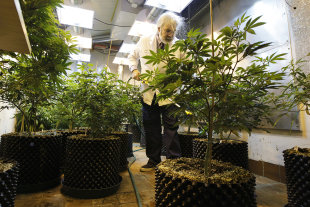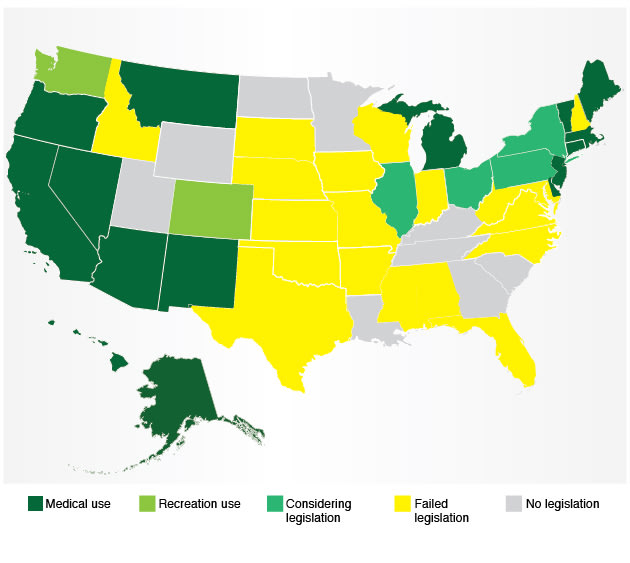The election on Tuesday decided more than just the presidential and Congressional races. Voters in Colorado, Washington and Massachusetts also approved measures that loosened the marijuana laws in their states, with the drug becoming essentially legal for recreational use under state law in Colorado and Washington, and legal for medicinal use in Massachusetts.
 That's right, it's finally legal (to a point).
That's right, it's finally legal (to a point).
Dave Meiler with the Marijuana Policy Project says it is "definitely a turning point in the war. It's showed the masses that people really do want normalized marijuana laws and are prepared to move this industry forward."
Marijuana policy was on six statewide ballots this week. Recreational use was the issue in Colorado, Washington and Oregon, while Arkansas and Massachusetts voters considered approving the drug for medicinal use. Montana voters struck down a measure that would have revived its previous medical marijuana program, and local voters in Palo Alto and San Diego, Calif. chose to keep dispensaries out of their cities.
In Colorado, the passage of Amendment 64 means state residents over the age of 21 will soon be able to possess up to an ounce of marijuana without penalty, and will be able to buy it in licensed stores by the end of 2013. According to the Colorado Center on Law and Policy (CCLP), the change could produce as much as $60 million in combined annual tax revenue and savings for the state budget. New excise tax receipts alone would total $24 million in the first year, according to CCLP's analysis, plus $8.7 million in new state sales taxes and $14.5 million in new local sales taxes.
For cash-strapped municipal governments, numbers like that are hard to ignore. According to a 2011 study of the 10 largest cities in Colorado, the only state for which data are available, medical marijuana (MMJ) sales generated nearly $10 million in annual tax revenues and Denver alone brought in $3 million on $82.2 million in gross sales. The Colorado capital is currently home to some 400 dispensaries and about 480 cultivation centers, and those businesses paid the city more than $6 million in license and application fees in 2011.
Coincidentally, 400-plus members of the marijuana industry were in Denver this week for the first annual National Marijuana Business Conference, where the recently passed laws and amendments were a hot topic of discussion.
How Legal Is "Legal"?
Of course, significant challenges remain. First and foremost, there is the fact that marijuana is still not legal, at least not as far as the feds are concerned. That's because marijuana possession and sale are still very much against federal law, no matter what state voters say. But enforcement so far has been hit or miss.
In fact, it remains to be seen whether or not, once the measures are officially enacted next year, residents will actually be able to go to the store, buy a bag of marijuana and take it home. Will the Department of Justice decide to supersede state law and strictly enforce the national marijuana laws? Will the federal government stand back and allow the states to handle their own affairs in this area?
"The bottom line is, this is a legitimate business that accounts for tens of thousands of jobs, brings in million in tax revenue and is growing larger every day," says Aaron Smith, executive director of the DC-based National Cannabis Industry Association (NCIA).
Still, major questions remain, and the industry is waiting to see whether or not the new Obama administration will leave marijuana enforcement to the states or whether they and all their customers will be tossed in jail in short order.
 A Coast to Coast Look at Marijuana's Legal Status
A Coast to Coast Look at Marijuana's Legal Status
And if that seems daunting to users, imagine the legal minefield medicinal marijuana dispensary owners face on a day-to-day basis. Not only are they knowingly violating federal law every time they transact business, they are being forced to operate on the fringe, with overlapping and contradictory expectations from state agencies, federal officials and even the tax administration. Banks won't do business with them because they are regulated at the federal level, leaving most dispensaries to operate on a cash basis. They can't get business checking accounts and can't set up credit card processing; in some cases owners have even lost access to their personal bank accounts.
"If I was a normal person with a normal risk tolerance, I couldn't do this," says Steve DeAngelo, owner of Harborside Health Center in Oakland, Calif., one of the largest and oldest medical marijuana dispensaries in the country. "But my motivation was different. I wanted to show that this is possible, show the swing voters that this is a real, legitimate business."
It wasn't easy. Working in a bank-free environment means DeAngelo has been unable to tap credit lines or even reach out to traditional investors. He started with little more than his personal savings and some generous friends and family, and admits he was lucky to have those backers.
"Most people in this business don't have that," he says. "So for them, this is a much riskier, more day-to-day type of business."
NCIA's Smith agrees, calling the lack of financial resources a "major problem."
"Not only do dispensaries have trouble with everyday banking," he says, "but they can't get financing, can't attract investors. It's a day-to-day headache, but beyond that, it's a security issue and a transparency issue. How do you pay sales tax? How do you deal with payroll taxes? There are ways around some of these requirements, but without change from the Treasury Department, we can't move forward."
The one area of the financial sector that has embraced MMJ is insurance. According to Patrick McManamon with Cannassure, a marijuana-focused insurance firm, dispensaries can be insured just like any other pharmacy or medical support business, and the industry has come a long way in terms of security and self-policing.
"The days of the former drug dealer opening up a dispensary are long gone," McManamon says. "These are business people now."
The Land of Opportunity
Toni Fox, owner of Denver's 3-D Medical Marijuana Dispensary, considers herself one of the lucky ones. She owned a construction company before opening her dispensary in 2010, and was able to convince the bank she had worked with previously to support her new endeavor by literally taking the bank president and its board on a tour of her facility.
Still, she's optimistic about the industry's future.
"This is a very exciting time to be a dispensary owner," she says. "It's really about to take off."
Click here to read more personal stories from the owners of medicinal marijuana dispensaries across the country.


